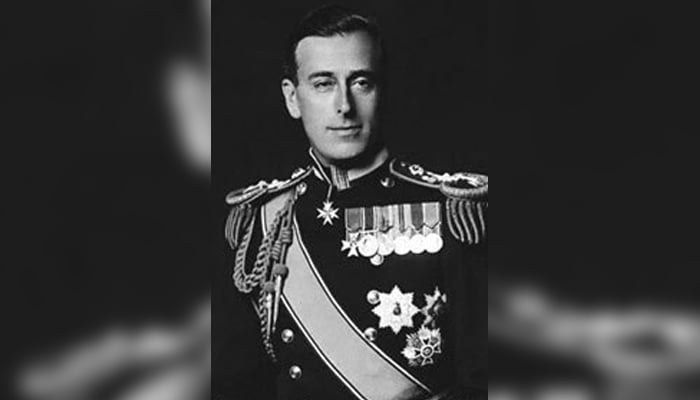Controversial role of Lord Mountbatten in The Radcliffe Award
Lord Mountbatten, the last viceroy of the British government harbored ill will against Mohammad Ali Jinnah since very inception. Lord Mountbatten met Jinnah 6 times during the month of April 1947. All those meetings were held in an uncongenial atmosphere. A proud and self-asserting viceroy who was well-known for his gigantic persuasive powers, tried his utmost to convince Jinnah to accept the proposal of a united India.
But Jinnah who had arrived at a well-considered opinion that hundred million Muslims of the subcontinent could not live an honorable life in united India couldn’t accept the proposal of Lord Mountbatten.
Equipped with miraculous will power and monumental determination, Jinnah impressed upon Lord Mountbatten that he would not move away by a hair’s breadth from his legitimate demand of the surgical operation of the subcontinent.
At last Lord Mountbatten agreed to the proposal with a heavy heart. Pakistan had to pay a very heavy price for its freedom. It was deprived of the Muslim majority state of Kashmir and the area of Gurdaspur and Zira, in fragrant violation of the principles of justice and fair play.
There are many stories about the contemptible act of tampering with the Punjab boundary commission report but the most prominent and reliable are those accounts which are given by Christopher Beaumont, secretary to the chairman, boundary commission, Cyril Radcliffe. Beaumont was an honest Indian civil service officer who performed commendable services in India since 1936 and was appointed on merit basis as a secretary to the chairman of the boundary commission.
After 40 years of the partition of the subcontinent, when his grandson, who was the student at The University of Cambridge was to write a thesis on the “Transfer of power to India in 1947”. At that juncture he was reminded of the foul play committed by Lord Mountbatten and Cyril Radcliffe jointly. The issue was aired very vehemently, and several letters and columns were written about the act of injustice committed by Lord Mountbatten and chairman of the commission.
Beaumont claimed that the congress official VP Menon approached him at midnight on August 11th, 1947 and expressed his desire to meet Cyril Radcliffe. Beaumont denied him the visit at that odd hour, although Menon had stated that he had come on the advice of Lord Mountbatten. Christopher Beaumont promptly replied, “that makes no difference.”
He (Beaumont) was of the firm opinion that Lord Mountbatten influenced Cyril Radcliffe to transfer the Muslim areas of Gurdaspur and Zira, which were already allocated to Pakistan, to India.
Another proof of the grave injustice committed by Lord Mountbatten and Cyril Radcliffe came to light when an advance copy of the division of the Punjab was sent to governor of the Punjab Lord Evan Jenkins on his request. The communal riots in Punjab were at their peak in August 1947. Lord Jenkins requested the Viceroy house for an advance copy of the division of the Punjab so that he could make essential security arrangements in the province. A sketch was sent to the governor which showed Gurdaspur and Zira inside the Pakistani territory. But when the general award was announced on August 15th, those Muslim areas were included in the Indian Punjab.
Governor Jenkins and all were surprised how those Muslim areas were transferred to India. What mystery had happened. The mystery was unearthed by Christopher Beaumont after many years when he came to know that his grandson was working on the same subject on which he was engaged in 1947. His conscience woke up and he disclosed the facts, as stated above.
Lord Mountbatten invited Cyril Radcliffe on a luncheon at the house of Lord Ismay, Chief of Staff to Lord Mountbatten. And he was clearly directed that the secretary of the chairman (Beaumont) should not be included in this lunch for the lack of space in the house. During this lunch meeting the Muslim majority areas of Gurdaspur and Zira, which were already allocated to Pakistan, were transferred to India, most unfairly.
-
 ‘Chinamaxxing’ Explained: Inside Viral Gen Z Trend Taking Over TikTok And Instagram
‘Chinamaxxing’ Explained: Inside Viral Gen Z Trend Taking Over TikTok And Instagram -
 Fears Erupt About Sarah Ferguson Pulling A ‘Harry’ While Sitting On A King’s Ransom: ‘Her Leverage Still Stands’
Fears Erupt About Sarah Ferguson Pulling A ‘Harry’ While Sitting On A King’s Ransom: ‘Her Leverage Still Stands’ -
 Lisa Rinna Slams Andy Cohen For His Below The Belt Move: 'So Shady'
Lisa Rinna Slams Andy Cohen For His Below The Belt Move: 'So Shady' -
 Stunning New Photos Of The Milky Way Shed Light On How Stars Are Formed
Stunning New Photos Of The Milky Way Shed Light On How Stars Are Formed -
 Prince Harry, Meghan Face Fresh Calls To Lose Royal Titles Over ‘pseudo-royal’ Visit
Prince Harry, Meghan Face Fresh Calls To Lose Royal Titles Over ‘pseudo-royal’ Visit -
 Gordon Ramsay On His Basal Cell Carcinoma Diagnosis
Gordon Ramsay On His Basal Cell Carcinoma Diagnosis -
 Fukushima Decommissioning: Japan Deploys Snake-like Robot To Remove Nuclear Debris
Fukushima Decommissioning: Japan Deploys Snake-like Robot To Remove Nuclear Debris -
 Brenda Song Turns Macaulay Culkin's 'Home Alone' Into 'terrible' Lesson: 'Children Have To Be A Little Scared'
Brenda Song Turns Macaulay Culkin's 'Home Alone' Into 'terrible' Lesson: 'Children Have To Be A Little Scared' -
 MrBeast Vows To Book Only Starlink-equipped Flights As Global Airline Adoption Surges
MrBeast Vows To Book Only Starlink-equipped Flights As Global Airline Adoption Surges -
 Kim Jong Un Says North Korea Ready To ‘get Along’ With US But Sets Key Condition
Kim Jong Un Says North Korea Ready To ‘get Along’ With US But Sets Key Condition -
 Andrew Fears What Comes Next As Jeffrey Epstein Scandal Deepens
Andrew Fears What Comes Next As Jeffrey Epstein Scandal Deepens -
 Inside Meghan Markle's 'scary' Postpartum Preeclampsia Journey
Inside Meghan Markle's 'scary' Postpartum Preeclampsia Journey -
 'Sinners' Creator Ryan Coogler's Bombshell Statement Comes To Light After Oscar Nomination
'Sinners' Creator Ryan Coogler's Bombshell Statement Comes To Light After Oscar Nomination -
 Teddi Mellencamp Pens Sweet Message As Daughter Dove Turns 6: 'Love You So Much'
Teddi Mellencamp Pens Sweet Message As Daughter Dove Turns 6: 'Love You So Much' -
 James Hetfield's Health Struggle Amid His 2026 Las Vegas Sphere Residency
James Hetfield's Health Struggle Amid His 2026 Las Vegas Sphere Residency -
 Princess Beatrice, Eugenie Are Now Facing The Same Wait As Their Parents: ‘Their Future Has To Be Decided’
Princess Beatrice, Eugenie Are Now Facing The Same Wait As Their Parents: ‘Their Future Has To Be Decided’




